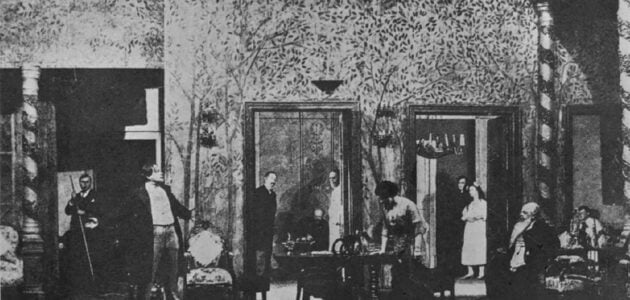
The Cherry Orchard (Chekhov)
The Cherry Orchard Synopsis
(Anton Chekhov, 1904)
The Cherry Orchard is Anton Chekhov’s last play and one of the most widely performed. It is centred on the fate of the Ranevskaya estate, which is under threat, the context of the play is important – it takes place after the liberation of the serfs in Russia, a time of great social and economic change.
At the beginning of the play, the mistress of the estate, Lubov Ranevskaya returns to the Estate from Paris with some family members and staff. An emotional reunion ensues with the servants and friends of the Estate. Stories are shared of what has been happening; the Cherry Orchard is to be sold off to pay debts, Lubov has lost all her money and the future seems bleak. At least the old, drunken servant Fiers is still alive, just.
Lophakin, a serf who grew up near the estate but who has become rich and successful and is expected to marry Lubov’s adopted daughter, proposes clearing the land and using it for summer homes which can be rented to provide an income. The family can’t face the thought of it, and as the play progresses, time and time again we see past events and the same subjects (marriage proposals, love affairs, teasing one another instead of engaging with Lophakin’s attempts to save the estate, which Lubov treats as simply too bourgeois. She refuses to move forward.
Lubov’s daughter is in love with Trofimov, ‘the eternal student’ who was once tutor to Lubov’s son who we learn has passed away. He presents a more socialist view – through him we get an alternative view of the Ranevskaya estate – one of injustice.
In the third act of the play, it is the day of the auction and the problem of what to do about the Estate has not been resolved and so Lubov decides to… have a party. They all wait to hear what is to become of the Orchard, and when the truth is revealed, it has been purchased by Lophakin, the one-time serf who tried to get the aristocrats to listen to his plans.
In the final act, the family must leave the Estate. Lophakin offers champagne – his time has come, while the family are devastated. He no longer intends to marry Lubov’s adopted daughter, and as one last symbol of the passing away of the old world, the old servant Fiers wanders drunkenly onto the scene, forgotten, and lies down.
The play is packed with poignant symbolism; the death of one world and the birth of another, the refusal of the past (represented by the aristocrats) to move forward and acknowledge the future (represented by Lophakin) and its ultimate destruction as a result. The themes of independence, power and social change are all very strong. There is also a lot of humour and plenty of irony throughout the play and it is this mixture of tragedy, comedy and social commentary that makes the play so successful.
Cherry Orchard Character List
Anya
Varya
Leonid Andreieveitch Gayev
Yermolai Alexeievitch Lopakhin
Charlotta Ivanovna
Yepikhodov
Madame Lyubov Andreievna Ranevskaya
Peter Trofimov
Boris Borisovich Simeonov-Pishchik
Dunyasha
Firs
Yasha
Stranger
The Stationmaster
The Postmaster

Leave a Reply